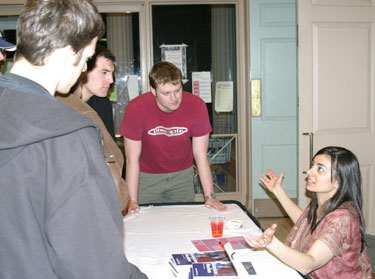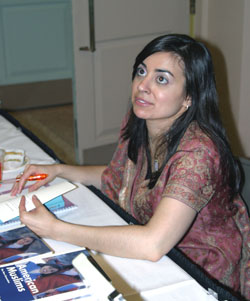Asma Gull Hasan does not wear a veil to cover her head.
She believes women should worship alongside Muslim men in Mosques.
She writes about social topics many in her religion consider taboo for discussion.
 Hasan, 29, author of two books, columnist, U.S. State Department
Ambassador, and frequent media news guest, spoke to nearly 100 students
and faculty at Wabash College Thursday night.
Hasan, 29, author of two books, columnist, U.S. State Department
Ambassador, and frequent media news guest, spoke to nearly 100 students
and faculty at Wabash College Thursday night.
"There are so many myths about Islam," Hasan said. "There are more myths than there are actually things known about Islam in this country. When you’re a speaker about Islam you’re sort of trained to be addressing the myths. It’s hard to make progress toward greater understanding when you’re too busy addressing the stereotype."
And true to her own post-speech analysis, Hasan spent most of her formal presentation debunking perceptions. She elects not to cover her head as many Muslim women do and she pointed out that many of the negative images of her religion are debunked when she researches the points in the Islam holy book, the Koran.
She peppers her presentation with humor and a light-hearted approach that many found disarming.
"Actually what she brought to my attention was this idea that traditions aren’t a part of Islam because I’m sure everyone has in the back of their minds these horrible ideas about Islam," Indianapolis senior David Rusk said. "I think why would we allow a religion like that to exist in the world and she specifically attacks those ideas saying there is nothing in the Koran that says Muslims should do these things."
Hasan even acknowledges the approach has been part of her success.
"Most people hear the words Muslim American woman and they’re instantly threatened," she said. "They think I’m going to come in and say American foreign policy is bad, America mistreats women and whatever else. Everybody just assumes I’m going to have all negative things to say, sometimes you can just feel the tension. That’s why I try to be funny and make fun of myself."
And she related to her all-male counterparts. A 1997 graduate of all-female Wellesley College, she compared Islam to Wabash College’s Gentlemen’s Rule. The Gentlemen’s Rule, the only rule governing Wabash men, encourages students to conduct themselves at all times in a gentlemanly manner.
 "Islam has a similar sort of spirit," she said. "I think we all want to
be quiet and spiritually strong. I fail at the quiet part but Islam
believes in one God and to be strong."
"Islam has a similar sort of spirit," she said. "I think we all want to
be quiet and spiritually strong. I fail at the quiet part but Islam
believes in one God and to be strong."
Rusk enjoyed her views on Islam while personally contemplating his own Christian faith.
"I’ve been having similar bouts with Christianity," he said. "I just finished talking to my fraternity brother about her speech and he was kind of disappointed. He wanted this revelation to come out of it. I was saying you run across this with every religion. You have text and you have different interpretations.
"I really enjoyed it because she took things from it and said I have this traditional view on this and I have this contemporary and more modern view on that. I was very, very satisfied."
Besides regular contributions to a number of publications, Hasan has written opinion pieces for the New York Times, Dallas Morning News, and San Francisco Chronicle. She has been a frequent guest on a number of Fox News Channel programs.
She has also worked for the United States State Department as an ambassador around the world. She visited England and France last fall.
"Well first, they don’t tell me what to say," she said. "I tell them I don’t want people to feel sorry for American Muslims. I think Muslims living in American have a good life. Like all Americans, we have a chance to make a lot of money, live a quiet life, go shopping at the mall and go to baseball games.
"There are no barriers unique to Muslims, just the same barriers that other ethnic or religious people face. I don’t think Muslims are any more mistreated than other people."
In responding to a question, she did say American Muslims were profoundly affected after 9-11. But the overwhelming emotion was one of comfort at the number of Americans who rallied to support them.
Still, she said, there are always concerns.
"We as Muslims are more suspicious than concerned. I don’t want to get stopped for speeding. And I really don’t want my brother to get stopped for speeding. There is nothing scarier than being a young Muslim male in this country."
She is not afraid to offer controversial opinions, but often does so in a non-threatening way.
"A lot of Muslims don’t like me because I don’t wear the cover and I’m too liberal. People may not agree with what you say but people respond to honesty and genuine feelings."
Hasan's appearance was sponsored by the Wabash College Muslim Student Association.
Hewitt is Wabash College's Director of New Media and Web Editor.
In photos:
At top right: Hasan signs books and talks with a group of Wabash men after her Mar. 31 speech.
Lower right: Hasan listens to a student question during her book signing.
On homepage:Hasan shakes hands with David Rusk after signing her book for him and answering questions.
For more information see: